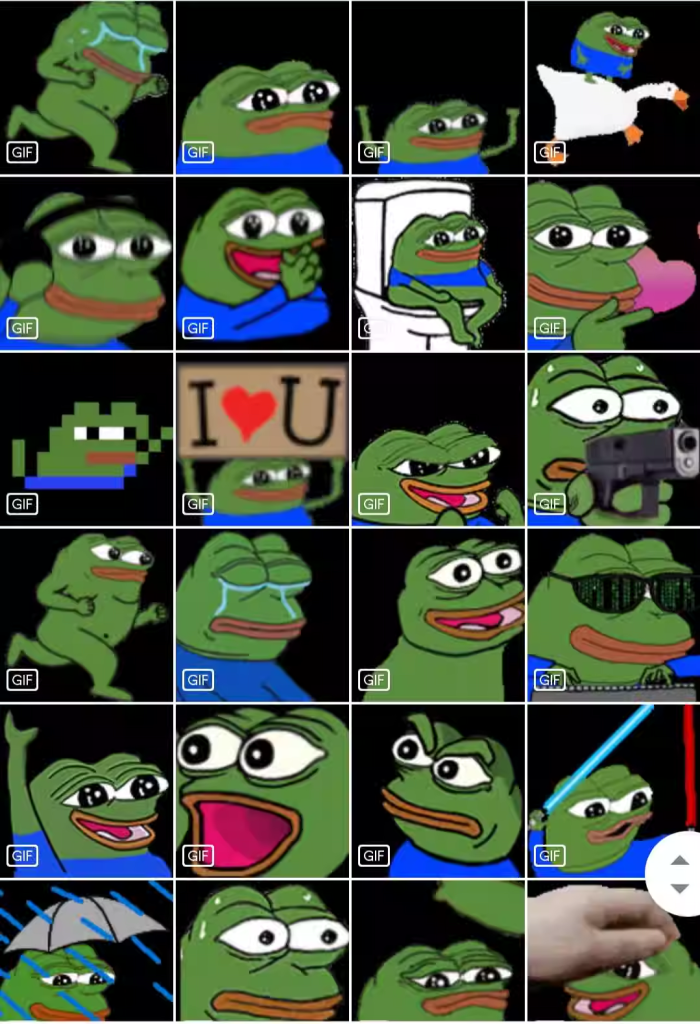Two years ago, when I first moved to the Netherlands to study economics as an international student, I was faced with different cultural shock at that time. For example, Coffeeshops there actually don’t sell coffee that shocked me who never saw drugs in my life in China. Moreover, when I have some eye contacts with neighbours or even strangers, I’d have to say hi and show my best smile to them.
After I got used to studying abroad alone, I gradually found some boundaries when communicating with classmates through WhatsApp – due to some policy in China, I never used WhatsApp before. Hence, my favourite sticker in WhatsApp was actually totally empty at that time and my classmates also didn’t use memes very often – that’s definitely not a good sign for me.
Usually when I talk to my friends online, we would use different memes to express how we feel. Otherwise the social climate would turn out to be serious between us. We often use some memes about cute animals to communicate – like dogs, cats, and frogs – to keep conversations playful and funny. There might be 2 memes between only 4 sentences when we chat to each other. But now I couldn’t even find any memes to show that I’m a friendly or talkative person. The chat box was always dominated by words only, instead of some funny memes. I found myself relying on ‘:)’ or ‘lol’ at the end of sentences to show that I was being light-hearted. But it just didn’t feel the same.



Example of memes in WeChat
Over time, I’ve started to rebuild my digital persona on WhatsApp, collecting stickers and memes to better express myself. Yet the number of memes I have collected is still way less than that in WeChat. And I even feel that I have dissociative identity disorder sometimes since my social masks in WhatsApp and WeChat are entirely different. On WeChat, I’m this energetic girl who throws memes around like confetti, someone who isn’t afraid to express herself. On WhatsApp, I feel like I’m wearing a different social mask, playing the role of the polite girl who adds a ‘:)’ to soften every sentence.
As I’ve adapted to using WhatsApp and communicating with people from different cultures, it made me wonder: Do I really need to be the same enthusiastic person online as I am in real life? In reality, I’m already a friendly, outgoing person—I greet people with a smile, try to be approachable, and make sure my interactions are warm. But is it important to carry this same level of energy into my digital presence?
On social media, there’s this unspoken pressure to be constantly engaging and cheerful. Whether it’s through sending memes, using playful emojis, or making sure your words always feel lighthearted, there’s a certain expectation to maintain a vibrant online persona. But honestly, does it really matter? Sometimes, I wonder if my digital self should be an extension of my real personality, or if it’s okay to let it be something different.
In WeChat, I’ve always been the “meme queen”—the person who uses cute animals to lighten up any conversation. It’s part of how I express myself online. But with WhatsApp, the more formal, less meme-driven platform, I’m often not as playful, and I find myself wondering if that’s a bad thing. Maybe it’s okay to have a different vibe online than in real life. After all, we all use social media in different ways—some people are more expressive online, while others prefer a more reserved approach. Rather than stressing about whether I’m coming across as friendly or energetic enough, I’m choosing to embrace a more relaxed approach. If my online messages don’t always capture my full personality, it doesn’t mean I’m not being authentic. Sometimes, it’s fine to just be myself, even if that means my words feel a bit flat or my jokes don’t land. At the end of the day, I’d rather be genuine than constantly worrying about how others interpret my online presence.



Insightful take on digital expression. Expression is really a tough thing to navigate not only digitally but also IRL, because we always behave in different ways in certain situations and with certain people, everyone is bound to get a different view on us. “But is it important to carry this same level of energy into my digital presence?” This question also made me wonder about the fact that because we always have our phones with us, we kind of assume that everyone is reachable 24/7 without taking into consideration that we assume different states and moods, which are almost never match the other person expectations of us. Sometimes I will read way too much into the way people text me and how people might interpret the way I text them, but I always try to be mindful of the fact that we don’t have to be a certain way 100% of the time.
I find it interesting how we often feel pressured to present a very accurate image of ourselves on social media. But the truth is, our online presence can’t fully capture the complexity of our personalities. Human character is very complicated and well-rounded and that cannot be fully made evident online. For example if someone is a dry texter, you don’t automatically assume that their character is dry and boring, but that they simply don’t put much effort into their texting for whatever reason. Sometimes I struggle to post something on Instagram because I’m trying to maintain some sort of personality there, which does reflect a part of my irl character, but can also limit me from showing other sides of myself. That whole concept is pretty silly – after all, it’s my social media and I should post what I like. At the end of the day, it’s not as deep as we like to make it out to be.
Very interesting read, I found it insightful on how different cultures vary in online expression.
A close friend of mine is spending a semester abroad in Shanghai, and I often see in her Instagram posts a lot of pictures and objects based on imaginary or real life “adorable” animals. Also, when I went on holiday to Japan this summer I noticed the same trend. I do not speak Mandarin unfortunately, but I know it’s a logographic language, where characters resemble their real life referent. I wonder if East Asian culture can be considered as more visually imaginative (e.g mangas, anime, original cartoons, kawaii subculture) because of this linguistic fact.
P.s I know most of the examples are Japanese not Chinese, but representation online and offline of cartoon characters and animals are quite popular in China too as you say in the article
I completely agree with your point. As an exchange student, I’m used to using the messaging app Line in Taiwan, which even has a “Sticker Shop” where people actually spend money to buy a variety of stickers to express their personalities in non-verbal ways. In contrast, WhatsApp is more focused on text-based communication, and this impacts the way I interact with new friends. I find myself taking extra time to think about how to convey the emotion behind my words in text, where there are no visual cues to show the underlying feelings in my messages.
Why we have different personas on WeChat and WhatsApp? I think the main reason is that, it is way too convenient to add more stickers on WeChat than on WhatsApp.
Another difference is that, we barely use emojis anymore because WeChat ruined this for us young generations. 🙂
Haha today I just talk about this with my friends. WeChat does have some special reaction for some emojis (like firework). But it’s just too convenient to use stickers on WeChat, which results in the fact that no one would use emojis anymore.
I can totally relate to your point about wondering if your digital self should be an extension of my real personality. I think we pay too much to attention to our online personas sometimes. It’s still social media at the end of the day, and no matter how hard you try to be your authentic self, we are still limited in our self expression when we’re interacting with others online. It’s impossible for social media to capture the true essence and complexity of who you are. Constantly trying to present yourself the fact same way you are in real life can get tiring and draining, as you always have to keep putting that effort and thinking about how you are perceived. It’s the best to embrace a more relaxed approach, and using stickers and memes for fun and because you want to, rather than trying to keep an image.